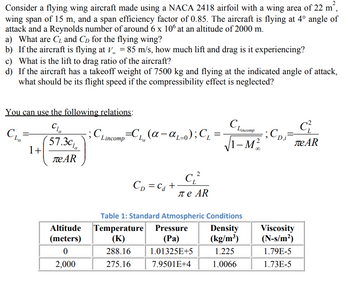Consider a flying wing aircraft made using a NACA 2418 airfoil with a wing area of 22 m², wing span of 15 m, and a span efficiency factor of 0.85. The aircraft is flying at 4° angle of attack and a Reynolds number of around 6 x 106 at an altitude of 2000 m. a) What are CL and CD for the flying wing? b) If the aircraft is flying at V = 85 m/s, how much lift and drag is it experiencing? c) What is the lift to drag ratio of the aircraft? d) If the aircraft has a takeoff weight of 7500 kg and flying at the indicated angle of attack, what should be its flight speed if the compressibility effect is neglected? You can use the following relations: Cla 57.30 La 1+ ле АR Altitude (meters) 0 2,000 ; CLincomp=C₁₁ (α-α=0); C₁² = La CD=Ca + C₁² ne AR Lincomp √1-M² Table 1: Standard Atmospheric Conditions Density (kg/m³) 1.225 1.0066 Temperature Pressure (K) (Pa) 288.16 1.01325E+5 275.16 7.9501E+4 =;CD₁i C² ле АR Viscosity (N-s/m²) 1.79E-5 1.73E-5
Consider a flying wing aircraft made using a NACA 2418 airfoil with a wing area of 22 m², wing span of 15 m, and a span efficiency factor of 0.85. The aircraft is flying at 4° angle of attack and a Reynolds number of around 6 x 106 at an altitude of 2000 m. a) What are CL and CD for the flying wing? b) If the aircraft is flying at V = 85 m/s, how much lift and drag is it experiencing? c) What is the lift to drag ratio of the aircraft? d) If the aircraft has a takeoff weight of 7500 kg and flying at the indicated angle of attack, what should be its flight speed if the compressibility effect is neglected? You can use the following relations: Cla 57.30 La 1+ ле АR Altitude (meters) 0 2,000 ; CLincomp=C₁₁ (α-α=0); C₁² = La CD=Ca + C₁² ne AR Lincomp √1-M² Table 1: Standard Atmospheric Conditions Density (kg/m³) 1.225 1.0066 Temperature Pressure (K) (Pa) 288.16 1.01325E+5 275.16 7.9501E+4 =;CD₁i C² ле АR Viscosity (N-s/m²) 1.79E-5 1.73E-5
Elements Of Electromagnetics
7th Edition
ISBN:9780190698614
Author:Sadiku, Matthew N. O.
Publisher:Sadiku, Matthew N. O.
ChapterMA: Math Assessment
Section: Chapter Questions
Problem 1.1MA
Related questions
Question
100%

Transcribed Image Text:Consider a flying wing aircraft made using a NACA 2418 airfoil with a wing area of 22 m²,
wing span of 15 m, and a span efficiency factor of 0.85. The aircraft is flying at 4° angle of
attack and a Reynolds number of around 6 x 106 at an altitude of 2000 m.
a) What are C₁ and CD for the flying wing?
b) If the aircraft is flying at V = 85 m/s, how much lift and drag is it experiencing?
c) What is the lift to drag ratio of the aircraft?
d) If the aircraft has a takeoff weight of 7500 kg and flying at the indicated angle of attack,
what should be its flight speed if the compressibility effect is neglected?
You can use the following relations:
Cla
57.30
La
1+
ле АR
Altitude
(meters)
0
2,000
;
=
Lincomp C₁₁ (α-αL=0); C₁:
La
Co=cat
C₁²
Te AR
CLincomp
√1-M²
Table 1: Standard Atmospheric Conditions
Density
(kg/m³)
1.225
1.0066
Temperature Pressure
(K)
(Pa)
288.16
1.01325E+5
275.16
7.9501E+4
CDi
C²
ле АR
Viscosity
(N-s/m²)
1.79E-5
1.73E-5
Expert Solution
This question has been solved!
Explore an expertly crafted, step-by-step solution for a thorough understanding of key concepts.
This is a popular solution!
Trending now
This is a popular solution!
Step by step
Solved in 6 steps with 1 images

Follow-up Questions
Read through expert solutions to related follow-up questions below.
Follow-up Question
Solve just D

Transcribed Image Text:Consider a flying wing aircraft made using a NACA 2418 airfoil with a wing area of 22 m²,
wing span of 15 m, and a span efficiency factor of 0.85. The aircraft is flying at 4° angle of
attack and a Reynolds number of around 6 x 106 at an altitude of 2000 m.
a) What are C₁ and CD for the flying wing?
b) If the aircraft is flying at V = 85 m/s, how much lift and drag is it experiencing?
c) What is the lift to drag ratio of the aircraft?
d) If the aircraft has a takeoff weight of 7500 kg and flying at the indicated angle of attack,
what should be its flight speed if the compressibility effect is neglected?
You can use the following relations:
Cla
57.30
La
1+
ле АR
Altitude
(meters)
0
2,000
;
=
Lincomp C₁₁ (α-αL=0); C₁:
La
Co=cat
C₁²
Te AR
CLincomp
√1-M²
Table 1: Standard Atmospheric Conditions
Density
(kg/m³)
1.225
1.0066
Temperature Pressure
(K)
(Pa)
288.16
1.01325E+5
275.16
7.9501E+4
CDi
C²
ле АR
Viscosity
(N-s/m²)
1.79E-5
1.73E-5
Solution
Knowledge Booster
Learn more about
Need a deep-dive on the concept behind this application? Look no further. Learn more about this topic, mechanical-engineering and related others by exploring similar questions and additional content below.Recommended textbooks for you

Elements Of Electromagnetics
Mechanical Engineering
ISBN:
9780190698614
Author:
Sadiku, Matthew N. O.
Publisher:
Oxford University Press

Mechanics of Materials (10th Edition)
Mechanical Engineering
ISBN:
9780134319650
Author:
Russell C. Hibbeler
Publisher:
PEARSON

Thermodynamics: An Engineering Approach
Mechanical Engineering
ISBN:
9781259822674
Author:
Yunus A. Cengel Dr., Michael A. Boles
Publisher:
McGraw-Hill Education

Elements Of Electromagnetics
Mechanical Engineering
ISBN:
9780190698614
Author:
Sadiku, Matthew N. O.
Publisher:
Oxford University Press

Mechanics of Materials (10th Edition)
Mechanical Engineering
ISBN:
9780134319650
Author:
Russell C. Hibbeler
Publisher:
PEARSON

Thermodynamics: An Engineering Approach
Mechanical Engineering
ISBN:
9781259822674
Author:
Yunus A. Cengel Dr., Michael A. Boles
Publisher:
McGraw-Hill Education

Control Systems Engineering
Mechanical Engineering
ISBN:
9781118170519
Author:
Norman S. Nise
Publisher:
WILEY

Mechanics of Materials (MindTap Course List)
Mechanical Engineering
ISBN:
9781337093347
Author:
Barry J. Goodno, James M. Gere
Publisher:
Cengage Learning

Engineering Mechanics: Statics
Mechanical Engineering
ISBN:
9781118807330
Author:
James L. Meriam, L. G. Kraige, J. N. Bolton
Publisher:
WILEY